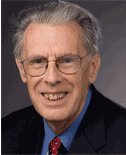John Hopcroft
Biography
Through pioneering research and wide-reaching textbooks, John Hopcroft and Jeffrey D. Ullman are known as two of the most influential figures responsible for shaping the field of computer science. These giants of computer science first met in 1964 when Dr. Ullman took Dr. Hopcroft’s automata theory course at Princeton University. Together, they wrote the book on automata theory and formal languages that was used by universities around the world to educate the first generation of computer scientists, Formal Languages and Their Relation to Automata. It’s successor, Automata Theory, Languages, and Computation, is still in use today.
Dr. Hopcroft is considered one of only a handful of computer scientists who created the discipline of theoretical computer science, unifying automata theory and formal languages during the late 1960s. He also determined that computer programming could be synthesized into a theory of algorithms and that these algorithms could be evaluated by their asymptotic complexity. This led to a set of design principles that could be used to design optimal algorithms. An IEEE Life Fellow, Dr. Hopcroft is also a member of the National Academy of Sciences and the National Academy of Engineering. He is currently the IBM Professor of Engineering and Applied Mathematics at Cornell University, Ithaca, N.Y.
